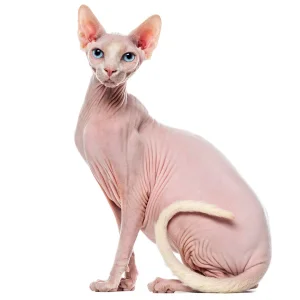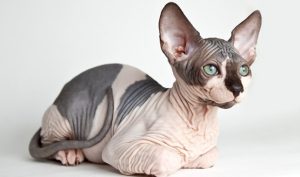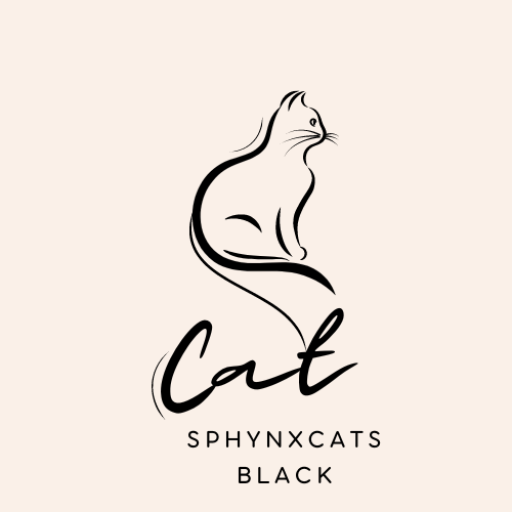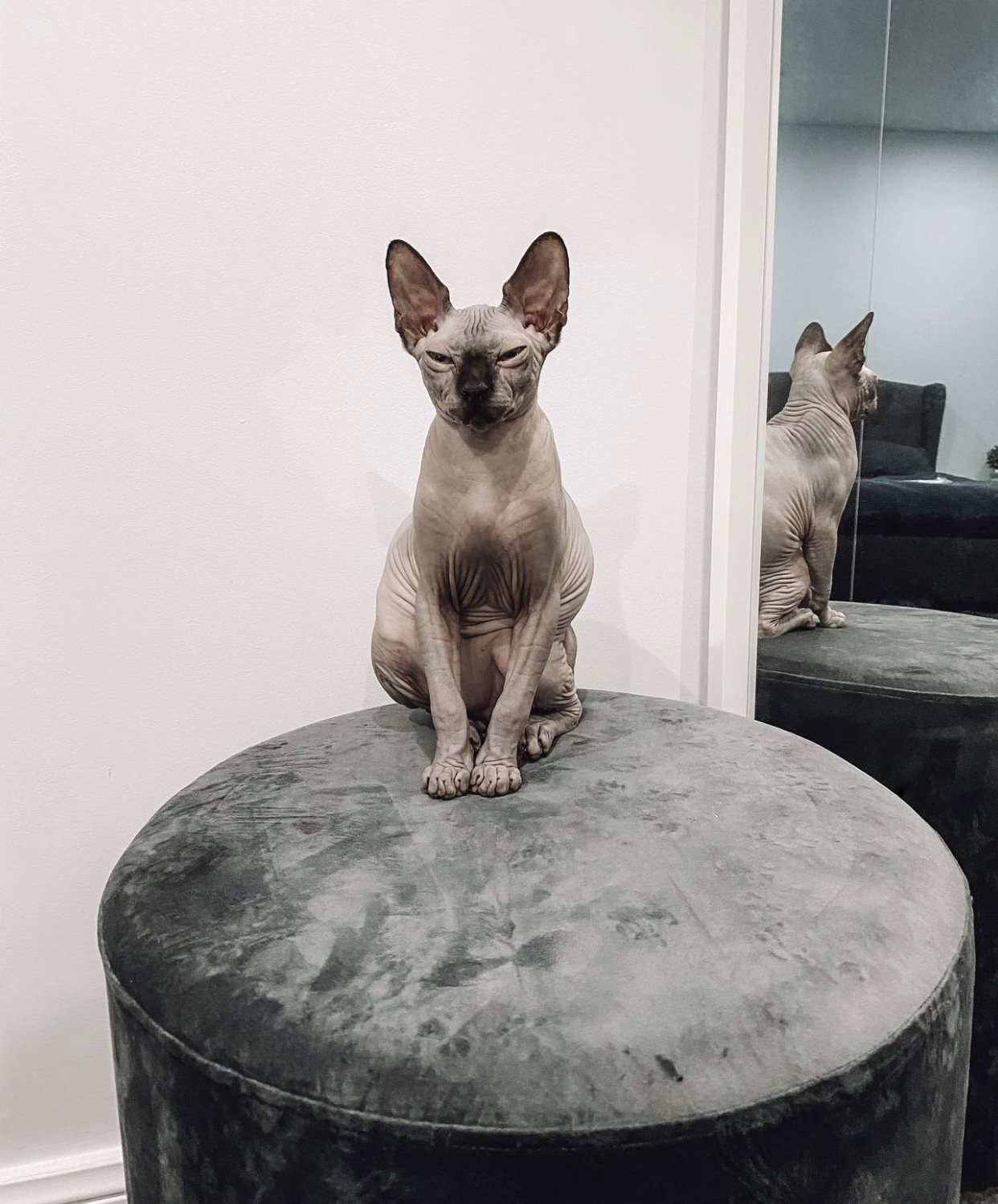Sphynx cats are a unique and distinctive breed known for their hairless appearance, wrinkled skin, and engaging personalities. Here’s more information about Sphynx cats:

sphynx
- Physical Appearance: Sphynx cats are characterized by their lack of fur, although they may have a fine downy layer of fuzz. Their skin feels warm to the touch and can have wrinkles, especially around the head and shoulders. They have large ears and a muscular, medium-sized body.
- Coat Care: Despite their lack of fur, Sphynx cats do require some grooming. They need regular bathing to remove excess oils that accumulate on their skin. Additionally, they may need protection from extreme temperatures due to their lack of insulation from fur.
- Temperament: Sphynx cats are known for their outgoing and affectionate personalities. They are social cats that enjoy being the center of attention and interacting with their human family members. They often seek warmth and may cuddle with their owners to stay cozy.
- Intelligence: Sphynx cats are intelligent and curious. They enjoy interactive toys, puzzles, and games that challenge their minds. They can also be trained to perform tricks and tasks.
- Vocalization: Sphynx cats are known to be quite vocal and expressive. They may use meows and other sounds to communicate with their owners and express their needs.
- Health Considerations: While Sphynx cats are generally healthy, they have specific health considerations due to their lack of fur. They are more susceptible to sunburn and may require sunscreen when outdoors. They can also be prone to skin conditions, so regular skin checks are important.
- Origin: Sphynx cats originated in the 1960s through selective breeding efforts. They are not truly hairless but rather have a very fine coat. The breed’s development aimed to create a distinctive and unique-looking cat.
- Popularity: Sphynx cats are a popular breed among cat enthusiasts who appreciate their unusual appearance and affectionate nature. They have a strong following worldwide.
- Indoor Living: Due to their lack of fur, Sphynx cats are best suited for indoor living to protect them from the elements and potential sunburn.
- Colors and Patterns: Sphynx cats come in various colors and patterns. Their skin coloration can vary, and they may have different color points or markings.
Owning a Sphynx cat can be a rewarding experience for individuals or families who are prepared to provide the necessary care and attention. They thrive in homes with lots of love and interaction and can be wonderful companions for those who appreciate their unique charm and personality.

sphynx
sphynx cat sphynx
Sphynx cats are a unique and distinctive breed known for their hairless appearance, wrinkled skin, and engaging personalities. Here’s more information about Sphynx cats:
- Physical Appearance: Sphynx cats are characterized by their lack of fur, although they may have a fine downy layer of fuzz. Their skin feels warm to the touch and can have wrinkles, especially around the head and shoulders. They have large ears and a muscular, medium-sized body.
- Coat Care: Despite their lack of fur, Sphynx cats do require some grooming. They need regular bathing to remove excess oils that accumulate on their skin. Additionally, they may need protection from extreme temperatures due to their lack of insulation from fur.
- Temperament: Sphynx cats are known for their outgoing and affectionate personalities. They are social cats that enjoy being the center of attention and interacting with their human family members. They often seek warmth and may cuddle with their owners to stay cozy.
- Intelligence: Sphynx cats are intelligent and curious. They enjoy interactive toys, puzzles, and games that challenge their minds. They can also be trained to perform tricks and tasks.
- Vocalization: Sphynx cats are known to be quite vocal and expressive. They may use meows and other sounds to communicate with their owners and express their needs.
- Health Considerations: While Sphynx cats are generally healthy, they have specific health considerations due to their lack of fur. They are more susceptible to sunburn and may require sunscreen when outdoors. They can also be prone to skin conditions, so regular skin checks are important.
- Origin: Sphynx cats originated in the 1960s through selective breeding efforts. They are not truly hairless but rather have a very fine coat. The breed’s development aimed to create a distinctive and unique-looking cat.
- Popularity: Sphynx cats are a popular breed among cat enthusiasts who appreciate their unusual appearance and affectionate nature. They have a strong following worldwide.
- Indoor Living: Due to their lack of fur, Sphynx cats are best suited for indoor living to protect them from the elements and potential sunburn.
- Colors and Patterns: Sphynx cats come in various colors and patterns. Their skin coloration can vary, and they may have different color points or markings.
Owning a Sphynx cat can be a rewarding experience for individuals or families who are prepared to provide the necessary care and attention. They thrive in homes with lots of love and interaction and can be wonderful companions for those who appreciate their unique charm and personality.
sphynx cats cost
The cost of a Sphynx cat can vary significantly depending on several factors, including the cat’s age, pedigree, breeder reputation, and geographic location. Here are some general price ranges for Sphynx cats:
- Pet Quality Sphynx: Pet quality Sphynx cats, which are not intended for breeding or showing, typically cost between $1,200 to $2,500. The exact price can vary based on factors like the breeder’s location and the specific kitten’s characteristics.
- Show Quality Sphynx: If you’re interested in a Sphynx with exceptional qualities suitable for cat shows, you can expect to pay a higher price. Show quality Sphynx cats can range from $2,500 to $5,000 or more.
- Breeding Rights: Some breeders offer Sphynx kittens with breeding rights for those interested in becoming Sphynx breeders themselves. These cats are usually more expensive and can cost anywhere from $3,000 to $6,000 or higher, depending on the lineage and breeder reputation.
- Additional Costs: Keep in mind that the initial purchase price is just one part of the cost of owning a Sphynx cat. You’ll also need to budget for ongoing expenses, such as vaccinations, grooming (Sphynx cats require regular bathing), high-quality cat food, litter, toys, and regular veterinary care.
- Geographic Variation: The cost of Sphynx cats can vary significantly by location. In areas where Sphynx cats are less common, prices may be higher due to limited availability. Conversely, in areas with more breeders, prices may be more competitive.
- Health and Testing: Reputable breeders invest in health testing and screening for their breeding cats to reduce the risk of hereditary health issues. These health tests can contribute to the cost of Sphynx kittens.
- Age: Older Sphynx cats or retired breeding cats may be available at a lower cost compared to kittens.
It’s essential to do thorough research and choose a reputable breeder when purchasing a Sphynx cat to ensure you are getting a healthy and well-socialized kitten. Reputable breeders provide documentation of health checks, vaccinations, and a pedigree. They also prioritize the well-being of their cats and kittens. Be cautious of extremely low prices, as they may be a red flag for substandard breeding practices.
Additionally, consider adoption as an option. Sometimes, SphynxS cats become available for adoption through rescue organizations or shelters, providing an opportunity to give a loving home to a cat in need. Adoption fees are typically lower than the purchase price from breeders.

